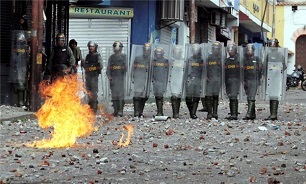Russia: US Moves Could Lead to Bloodshed in Venezuela
 Russia stated that events in Venezuela are reaching a dangerous point, and that the US was turning a blind eye to international law.
Russia stated that events in Venezuela are reaching a dangerous point, and that the US was turning a blind eye to international law.
Interfax cited Sergei Ryabkov, the Russian Deputy Foreign Minister, as saying Moscow would stand with Venezuela to protect its sovereignty and the principle of non-interference in its domestic affairs.
"We warn against this. We believe that this would be a catastrophic scenario that would shake the foundations of the development model we see in the Latin American region", Ryabkov said in an interview with the International Affairs magazine, according to Sputnik.
The diplomat stressed that Moscow would support Caracas on the matter, also regretting that the Organisation of American States "was to a large extent involved in this" and "added fuel to the fire".
"As we see how the situation in Venezuela develops, we note the willingness of a certain group of countries, including the United States, to use different platforms such as the Organization of American States, to increase pressure on our ally Venezuela under different pretexts… But we have always supported and will support friendly Venezuela that is our strategic partner", he stated.
The official also underlined that Washington uses pressure, blackmail, and bribery in order to force other countries stop their cooperation with Russia.
The foreign ministry also said in a statement on Thursday that Russia is ready to cooperate with all countries, which will contribute to finding political common ground in Venezuela.
"The goal of the international community is to contribute to finding mutual understanding between various political forces in Venezuela, for which national interests are a priority. We are ready to cooperate in this effort with all countries, which share these goals," the statement said.
Russia believes that any political activity should be carried out strictly in line with the constitution and national law.
"Certainly, the citizens of this country [Venezuela] can openly express their own position, including at manifestations, but by solely peaceful means, which does not result in violence and moreover jeopardize the citizens’ security," it added.
Kremlin Spokesman Dmitry Peskov recalled on Thursday that Venezuela has not requested Russia’s assistance yet, saying, "There have been no such requests so far."
According to Peskov, it is inappropriate now to discuss Moscow’s potential answer to Caracas, if such a request is received.
"Eventual arguments are hardly appropriate here," he added.
Russian Foreign Ministry Spokeswoman Maria Zakharova also stated that recognition of the rebel president in Venezuela is a prime example of Western disrespect for international law and sovereignty, according to RT.
“The example of events in Venezuela shows clearly how the progressive Western community actually treats international law, sovereignty and non-interference in internal affairs of states – by handpicking the government there,” Zakharova said.
Oil-rich Venezuela is mired in economic turmoil, with hyperinflation, power cuts and shortages of basic items. President Nicolas Maduro was sworn in for a second term, after a vote marred by an opposition boycott and claims of vote-rigging.
The president of Venezuela's opposition-led National Assembly, Juan Guaido, has declared himself interim president of the country and was immediately recognized by the United States, which is accused by Caracas of plotting to topple Maduro.
Minutes later, US President Donald Trump recognized Guaido as the “legitimate” interim president of the Latin American country, calling on other governments in the Western Hemisphere to also recognize Guaido.
Shortly after Trump's recognition of Guaido as Venezuela’s interim president, Maduro said he was severing diplomatic and political ties with the United States.
Signing "a diplomatic note", the Venezuelan president stressed that he would give "the entire diplomatic and consular personnel of the United States of America in Venezuela 72 hours to leave the country".
At a rival gathering from the presidential palace broadcast live on state television, Maduro also accused the opposition of seeking to stage a coup with the support of the US, which he said was seeking to govern Venezuela from Washington.
In 2017, Trump said he would not “rule out” a military option for Venezuela to solve the ongoing crisis in the country.
Washington also intensified unilateral sanctions on the socialist country, announcing bans on Maduro’s wife and several of his top allies to further increase pressure on the government in early September.
Message end/
